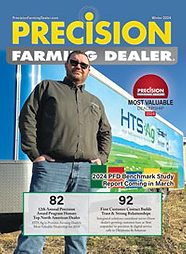One of my favorite late-night talk show segments when I was in college was Conan O’Brien’s “The Year 2000.” The recurring bit was both topical and absurd, poking fun at pop culture trends.
Gems like “robots will do 80% of our housework ... and we will do 90% of theirs,” or “scientists will discover the secret ingredient in Starbucks coffee: a chemical that makes people forget they are paying $4 for a cup of coffee,” were common.
Eventually, the calendar did flip over to the year 2000, but the show kept on with the bit, playing to the notion that maybe the future really wasn’t all that different than the present, just a more accessible and acceptable version of it.
There are likely more people than ever looking toward the future — pick your reason right now — but the reality is it will be here before we know it. This can be both a paralyzing and comforting thought for farm equipment dealerships.
On one hand, the future is unpredictable. But on the other hand, the future creates infinite potential, for the prepared. As Owen Palm, CEO of 21st Century Equipment frames it, “The pace of change has never been so fast and change will never be this slow again.
“For each of us to continue to be relevant to our customers, we all need to have a fundamental understanding of the quickly changing landscape of precision agriculture and agriculture, in general.”
Palm will be among the speakers at the 2021 Precision Farming Dealer Summit, Jan. 11-12, who will reflect on lessons learned of the last year and also where opportunity exists moving forward.
So how far-fetched is the future? Our editors solicited outlook for several industry experts to get their forecast and a central theme — not surprisingly — is that technology will be at the core of change.
Grower Contact Managers. This type of employee within a dealership with be the local resource for customers, helping them navigate all of the complexities of planning, coordinating, operating and purchasing the products and services that are needed for successful autonomous operations, says Tim Norris, business development manager with Raven Autonomy.
More specialized service and support wrapped around autonomous vehicles will include a Mission Planning/Operation Control Center, for creating the missions for autonomous operations as well as pre-loading field boundaries and variable-rate application prescriptions into the machines for the grower.
“I see these centers needing to be either local or regional, but most importantly they will need to have a good understanding on how operations are performed in each region. They will need to work hand in hand with the customer’s agronomist.”
A Galaxy Nearby… One way to envision the partnership robotics and agriculture will forge in the future is to picture a couple of icons. Two type of robot assistants will be integrated into the dealership, says George Russell, founder, Machinery Advisors Consortium.
“The R2-D2 type will use data analysis and AI to speed up troubleshooting, help anticipate parts and special tools needed and do other things to make repairs faster,” he says. “This will include older machines — younger techs won’t have experience with older machines.”
This type will also help in parts to stock and do inventories as well as recording and transmitting information in the shop.
“The C-3PO type will help with the repetitive, dangerous or heavy activities,” Russell adds. “For changing tires, adding duals, replacing row components or help with setup for big machines, employees will have a robot help.”
Unlearning the Learned. Dealers will have to be adaptable at new levels of service to compete with the Apple and Microsoft as they enter the ag landscape. According to Jim Henderson, executive partner with the Exemplary Group, dealers will need to shift to and way from solution components, always keeping an eye on the success of their customers.
“This change will require learning how to “unlearn” and how to integrate solutions, while understanding and staying in sync with the dominant players,” he says. “As farm operations scale, these large organizations will also want partners with the scale to serve them. This may lead to national accounts, consolidation and products that do not have territories.”
Most important, Henderson says the precision group will become the entire dealership. A goal will be for customers to be trained on how to operate digitally; it will be assumed that internal staff does so.
So if Precision Farming Dealer decided to host a “In the Year 2030” segment, would any of the above sound too absurd, too obscure to make sense in 10 years? Or are we really closer than we think?



![[Technology Corner] Future of Drone Use in U S Brighter After FAA Regulation Change](https://www.precisionfarmingdealer.com/ext/resources/2024/04/11/4-12-24-Slides_OTR14.jpg?height=290&t=1712932011&width=400)



Post a comment
Report Abusive Comment